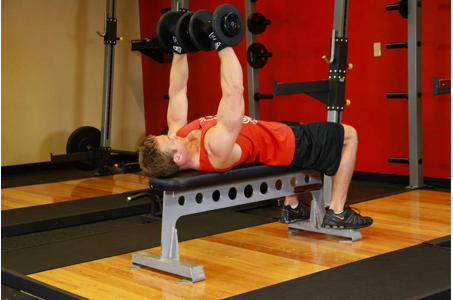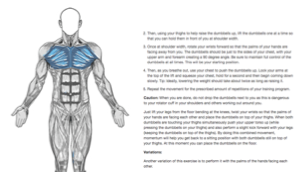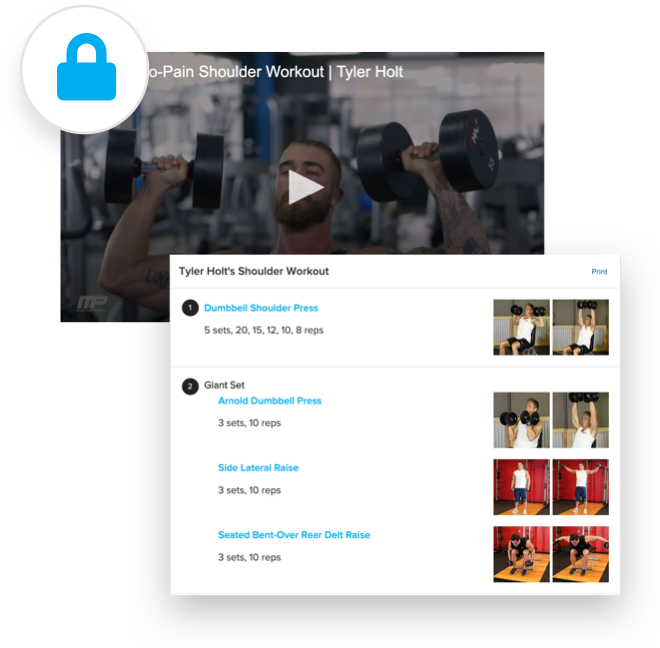Coming up with your perfect bodybuilding workout program and diet to match can seem like quite the process. You have to plan how many days a week you're going to workout, what exercises you will include in your program, how long your rest periods will be, how many reps you should perform for each exercise, and on and on it goes.
Many individuals do tend to feel slightly overwhelmed with the amount of information available out there as to what works 'best', and therefore take more time than they should to even get going.
You always must remember that half the battle is just getting started, so avoid going into too many details that are just going to hold you up from playing the game.
The sooner you can get into the gym and start actually pushing the weights, the sooner you will start building muscle and seeing your body transform into your ideal physique.
That said, you obviously do need to make sure you are following some sound strategies so that the workouts you are doing will help you build muscle. If you pay heed to these rules, chances are you are going to be on the way to success as long as you also are sure that the nutrition part of the equation is included as well.
6 Bodybuilding Tips For Results
Tip 1: Focus On Lifting More Weight Over Time
The first bodybuilding tip that will make the single biggest difference on your rate of muscle gain is whether you are able to consecutively add more weight to the bar.
It's not going to matter how many fancy principles you use, if you aren't increasing the sheer amount you are lifting over a few months of time, you aren't building muscle as quickly as you should be.
The number one priority of any muscle gaining bodybuilding workout program should be lifting heavier and heavier weights.
When you get 'stuck' and aren't able to bump the weight up higher, that's when you start tinkering with other strategies such as drop sets, supersets, etc., as a means to help increase the body's potential, so that in a few more weeks, you can bump it up to the next weight level.
All those fancy protocols will definitely have an advantage down the road once you've attained a level of musculature you're satisfied with, but until that point, you should use them intermittently when you're unable to lift heavier.
Tip 2: Go One Rep Short Of Failure
The second bodybuilding tip to pay attention to is the rule on failure. Some people believe that lifting to failure each and every single set is the best way to build muscle. They think that in order to get a muscle to grow, you have to fully exhaust it.
While it is true that you have to push the muscles past their comfort level in order to see progress, you can run into a number of problems when you're lifting to failure each and every set.
The first major issue is central nervous system fatigue. Workout programs designed to go to failure each and every time will be very draining on the CNS.
After a few weeks of such a program, it's highly likely that you'll find the CNS is so exhausted that you can't even lift the weight you used to for the required number of reps little own increase it upwards.
The second problem with going to failure is that if you do this on the first exercise out in the workout, you're not going to have much for a second, third, and fourth exercise after that.
Since you should be doing at least a couple of different exercises in each workout you do, this becomes very difficult to accomplish.
Instead, aim to go one to two reps short of failure. This will still get you pushing your body hard and working at the intensity level needed to build muscle, but it won't completely destroy you so that you have to end that workout prematurely and take a day or two off just to recoup.
Tip 3: Only Perform Exercises That Work At Least Two Muscle Groups At Once
Bodybuilding tip number three is to focus on compound exercises. You only have a limited amount of time you can spend in the gym each day due to both time and recovery restraints so if you waste this time on exercises that only work one or two smaller muscle groups, you aren't exactly maximizing your potential.
Instead follow the rule that for 80% of your workout you'll only perform exercises that work at least two muscle groups.
The shoulder press, for example, will work the shoulders and the triceps. The squat will work the quads and the hamstrings. The bench press will work the shoulders, chest, and the triceps (even the biceps to a very small degree).
On the other hand, the barbell curl will only work the biceps, triceps pushdowns will only work the triceps, and leg curls will only work the hamstrings.
All of those exercises aren't really giving you the best results-to-energy invested trade-off, so it's best you keep them limited.
What's more is that compound lifts you'll typically be able to lift more weight with, and since you read the first tip in this article, you know that's paramount to success.
Tip 4: Fuel Your Body Right Before And After The Workout
The fourth tip to follow with your bodybuilding workout program is to make sure you're fueling your body properly both before and after the workout.
Failing to get in the amino acids your body will use to synthesize new muscle mass with or the carbohydrates that provide the energy to formulate the new muscle tissue is a critical error that will garner a lack of results.
If there is one time you can't be uncertain about your nutrition, it's at these two points in the day.
Throughout the rest of the day you can be a bit more flexible in terms of meal times and composition provided you're still meeting your calorie and macronutrient needs, but before and after the workout things need to be 100% 'on'.
Tip 5: Never Go More Than Two Weeks Without A Change
Fifth is the plateau busting bodybuilding tip. If you've ever reached a point with your workouts where it feels as though you are just not gaining any more muscle, this is a sure sign you're in a plateau.
Plateaus do tend to impact just about everyone at some point or another unless you are being very careful to avoid it.
What exactly is a plateau? A plateau can be defined as any point in time where you go more than two weeks without any type of progress. To you, the dedicated lifter, it spells wasted gym effort and time.
In order to prevent this plateau from occurring, your job is to make sure something in your program is always changing. This could be the order of which you perform the exercises, the amount of rest you take in between sets, or even the type of exercises you are performing.
If you can't bump up the weight in a successive session, it's time to change something else. If you do that, you will be sure you get the results you're looking for.
Here’s an effective full-body workout to use as a change of pace from your normal training:

BodyFit
$6.99/month- 2,500+ expert-created single workouts
- 3,500+ how-to exercise videos
- Detailed workout instruction
- Step-by-step workout tips
- Training at gym or at home
- Access to Workout Plans
- Access to Bodyfit App
- Store Discounts
Already have a Bodybuilding.com account with BodyFit? Sign In

What comes with BodyFit?

- Instructional Videos
Don't risk doing a workout improperly! Avoid injury and keep your form in check with in-depth instructional videos.

- How-to Images
View our enormous library of workout photos and see exactly how each exercise should be done before you give it a shot.

- Step-by-Step Instructions
Quickly read through our step-by-step directions to ensure you're doing each workout correctly the first time, every time.
Tip 6: Remember Rest Is Required
Finally, to end off our bodybuilding tips, always remember to rest. Far too many people make the mistake of training too hard, too often, without allowing time for recovery.
If you don't allow the body to rest before you go back in the gym, instead of getting stronger, you're just breaking it down further and getting weaker.
Ideally you should take one day off between each weight lifting workout, but if you prefer to do an upper/lower split that has you working out at a greater frequency, then just be sure you have at least two full days off a week.
Also, for the cardio-minded, this does not mean go and do forty-five minutes of intense cardio activity. This means rest - active rest if you must (as in a light walk, jog, or swim).
If you try to push your body hard in other activities on your designated days off, it's going to impact progress.




